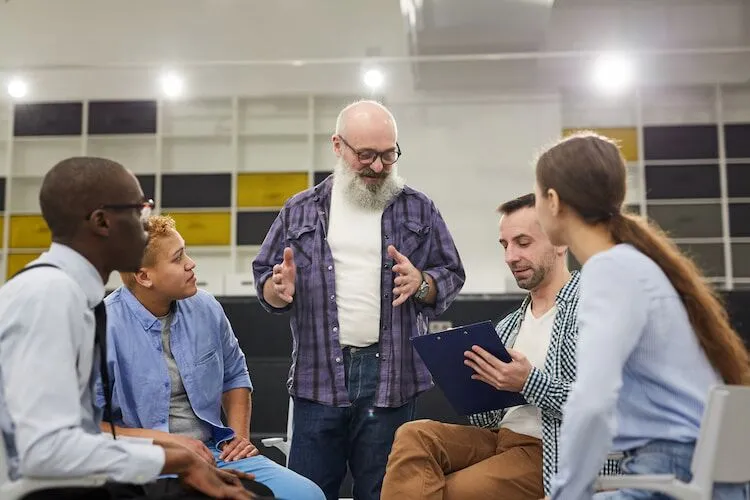24/7 Helpline:
(866) 899-221924/7 Helpline:
(866) 899-2219
Learn more about Group Therapy centers in Arapahoe County
Group Therapy in Other Counties

Other Insurance Options

Ceridian

Optum

Sutter

Molina Healthcare

CareFirst

PHCS Network

WellPoint

Choice Care Network

WellCare Health Plans

Providence

Health Partners

Absolute Total Care

ComPsych

Regence

Humana

Sliding scale payment assistance

AllWell

BlueShield
Beacon

BlueCross

New Beginnings Recovery Center
New Beginnings Recovery Center is a non-profit rehab located in Littleton, Colorado. New Beginnings ...

All Health Network – Davies Avenue
All Health Network - Davies Avenue provides comprehensive treatment for children and their families ...

Milestone Counseling
Milestone Counseling is an outpatient rehab located in Littleton, CO. Milestone Counseling specializ...

Broadway Counseling Services
Broadway Counseling Services is a private rehab located in Englewood, Colorado. Broadway Counseling ...

Williams Counseling
Williams Counseling is a private rehab located in Littleton, CO. Williams Counseling specializes in ...

Beverly Hawpe and Associates
Beverly Hawpe and Associates is a private rehab located in Littleton, Colorado. Beverly Hawpe and As...

All Health Network
All Health Network provides a wide range of services for individuals struggling with some kind of be...

Gallus Detox Center
Gallus Detox Center is a private rehab located in Littleton, Colorado. Gallus Detox Center specializ...

Counseling Center of the Rockies – South
Counseling Center of the Rockies - South is a private rehab located in Englewood, CO. Counseling Cen...

2Xtreme
2Xtreme is a private rehab located in Littleton, Colorado. 2Xtreme specializes in the treatment of a...

Highlands Behavioral Health System
Highlands Behavioral Health, located in Littleton, Colorado, offers alcohol and drug rehab programmi...

Denver Springs
Denver Springs is a private rehab located in Englewood, Colorado. Denver Springs specializes in the ...

All Health Network – Bridge House
All Health Network - Bridge House is a crisis stabilization unit for those individuals with mental i...


























Circle of Concern Consortium
Circle of Concern Consortium is a private rehab located in Englewood, Colorado. Circle of Concern Co...

Arapahoe House – New Directions for Families
Arapahoe House – New Directions for Families is a private rehab located in Littleton, Colorado. Arap...

Awareness Counseling Center
Awareness Counseling Center is a private rehab located in Englewood, Colorado. Awareness Counseling ...

Accessible Treatment Services
Accessible Treatment Services is a private rehab located in Littleton, Colorado. Accessible Treatmen...

Arapahoe – Douglas Mental Health Network – Turning Points
Arapahoe – Douglas Mental Health Network – Turning Points is a private rehab located in Littleton, C...

Dragons Den
Dragons Den is a non-profit rehab located in Englewood, CO. Dragons Den specializes in offering an a...

Genesis Counseling Highlands Ranch
Genesis Counseling Highlands Ranch is a private rehab located in Littleton, Colorado. Genesis Counse...

Williams Counseling
Williams Counseling is a private rehab located in Englewood, Colorado. Williams Counseling specializ...

Lighthouse Counseling Center
Lighthouse Counseling Center offers outpatient treatment for individuals with alcohol and/or substan...

Dynamic Directions Counseling
Dynamic Directions Counseling is a private rehab located in Littleton, Colorado. Dynamic Directions ...

ATOPS – Highlands Ranch
ATOPS - Highlands Ranch is located in Littleton, Colorado. ATOPS - Highlands Ranch is a premier alco...

Certified Rehabilitation Specialist
Certified Rehabilitation Specialist is a private rehab located in Littleton, Colorado. Certified Reh...

Arapahoe – Douglas Mental Health Network
Arapahoe – Douglas Mental Health Network is a private rehab located in Littleton, Colorado. Arapahoe...

Casepro
Casepro is a private rehab located in Littleton, Colorado. Casepro specializes in the treatment of a...

Southwest Family Services
Southwest Family Services is a private rehab located in Littleton, Colorado. Southwest Family Servic...

Healing in Motion
Healing in Motion is a private rehab located in Littleton, Colorado. Healing in Motion specializes i...

Right Avenue Counseling
Right Avenue Counseling is a private rehab located in Englewood, Colorado. Right Avenue Counseling s...

Happy Way – AA – Alcoholics Anonymous
Happy Way – AA – Alcoholics Anonymous is a non-profit rehab located in Englewood, Colorado. Happy Wa...

Cottonwood Counseling and Family Services
Cottonwood Counseling and Family Services is a private rehab located in Littleton, Colorado. Cottonw...

Third Way Center
Third Way Center is a private rehab located in Englewood, Colorado. Third Way Center specializes in ...

A Bridge To Well – Being
A Bridge To Well – Being is a private rehab located in Englewood, Colorado. A Bridge To Well – Being...

Agape Counseling Center
Agape Counseling Center is a private rehab located in Littleton, Colorado. Agape Counseling Center s...

Rocky Mountain Equine Assisted Psychotherapy
Rocky Mountain Equine Assisted Psychotherapy is a private rehab located in Littleton, Colorado. Rock...

Colorado Center for Rehabilitation
Colorado Center for Rehabilitation is a private rehab located in Englewood, Colorado. Colorado Cente...

Halcyon Group
Halcyon Group is a private rehab located in Englewood, Florida. Halcyon Group specializes in the tre...

TMS Therapy – New England Center for Mental Health
TMS Therapy – New England Center for Mental Health is a private rehab located in Littleton, Massachu...

White Mountain Mental Health
White Mountain Mental Health is a private rehab located in Littleton, New Hampshire. White Mountain ...

Van Ost Institute for Family Living
Van Ost Institute for Family Living is a private rehab located in Englewood, New Jersey. Van Ost Ins...










































































